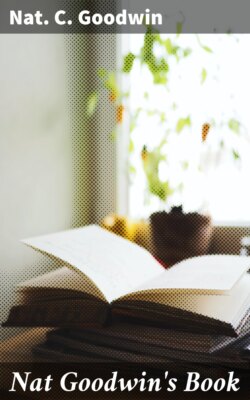Читать книгу Nat Goodwin's Book - Nat. C. Goodwin - Страница 13
На сайте Литреса книга снята с продажи.
SIR HENRY IRVING
ОглавлениеTable of Contents
After the Dramatic Festival my wife and I embarked for Europe. It was during this time that I made the acquaintance of Henry Irving who was then managing successfully the Lyceum Theatre in London. Irving apparently took quite a fancy to me. He showed me many attentions and I was the recipient of many hospitalities at his hands.
Irving was an extraordinary man in many ways and considering what nature had denied him his achievements were little short of marvelous. Possessed of a voice of but little power, utterly lacking in grace, even ungainly and awkward in action, he was possessed of that occult power that made all those infirmities subservient to his fine intellect.
I think that Irving had a wider knowledge than any man whom I have ever met in the theatrical world. So much has been written by able writers regarding this remarkable man's abilities that anything that emanates from me will seem puerile in comparison.
Irving's humor always appealed to me, his sense of it ever being in evidence no matter how serious the surroundings. His utterances were subtly humorous and at times a little cynical, but never harsh, his gentleness of delivery always disguising the little cynicisms that might lurk beneath them.
I remember lunching with him one afternoon at the Garrick Club. An actor named Kemble came in, a little under the influence of the succulent grape, and began bewailing the decline of the drama. He expatiated upon the downward trend of the player, expressing great dissatisfaction over the then present conditions and his desire to "chuck it." He preferred solitude, away from the incompetency that he was forced to witness. He would like to build a shack and relieve himself from all these humiliating associations on some desert island. Irving, calmly wiping his glasses, looked at him for a moment and asked, "Why not try one of the Scilly Islands?"
Another time an awful bore, one Fletcher, whom Irving detested, rushed up to him in a most affectionate manner, saying, "My dear Harry! whom do you suppose I met in Paris, last week?" Irving replied, "I have no idea. Paris is so filled with people." Fletcher continued, "I know, dear Harry, but it was our old friend Graham—Charlie! You remember him." Irving grunted, "Ah!" Fletcher rattled on. "Well, Harry, you know we had not met for years and he accosted me right in front of the Louvre and placing both hands upon my shoulders he said, 'Great God! is this really Fletcher?'" Irving quietly looked up and queried, "And was it?"
We passed many happy evenings, together with dear old Johnny Toole, at the Beefsteak Club. I look back with pleasure upon those improvised little suppers Irving used to bestow upon the visiting Americans and his fellow players upon the stage of the Lyceum after the evening performance. I have never seen such unostentatious, yet lavish, display as he exercised in those delightful hospitalities. They extended far into the night and many times the sun was up as he, Toole and I made the rounds of the Covent Garden Market where the butchers and fruit venders were as friendly disposed towards him as were the guests of the previous evening.
I never knew when Irving slept.
The last time we met was in his dressing-room at the Broadway Theatre, New York. I had just produced "A Midsummer Night's Dream" at a great outlay—a new experience for me at the time—investing a fortune on the production before receiving the verdict of the capricious public. It was an old story with Irving. As I shook hands with him he said, "Ah! Goodwin, my boy, I see you are indulging in a little Monte Carlo around the corner." I answered, "Yes, Sir Henry, I have a big bet down on the single 0." "Well," said he, "this business is a fascinating gamble no matter where the little ivory ball may land."
The little ivory ball proved in the end very disappointing to this splendid player who did so much to dignify our art. For when the ball fell into the single "0" Sir Henry's bet was on the black, No. 23. Had he lived he would have found it impossible to indulge again in the dissipation of costly productions.
[back]
Sir Henry Irving
An extraordinary man
